
E-Learning and Digital Media
Scope & Guideline
Exploring the future of learning in a digital world.
Introduction
Aims and Scopes
- E-learning and digital pedagogy:
The journal focuses on innovative teaching practices that integrate digital tools into educational settings, emphasizing the development and implementation of e-learning strategies. - Impact of technology on learning outcomes:
Research published in the journal investigates how various technological interventions affect student engagement, achievement, and overall learning experiences. - Blended and online learning environments:
The journal explores the dynamics of blended learning and fully online educational environments, providing insights into their design, effectiveness, and student perceptions. - Educational equity and access:
It addresses issues of access to technology and digital literacy, examining how these factors influence educational equity in diverse contexts. - Teacher training and professional development:
The journal highlights the importance of ongoing training for educators in utilizing e-learning tools effectively, exploring their perceptions and readiness to adopt new technologies. - Emerging technologies in education:
Research on the implications of new technologies, such as artificial intelligence, virtual reality, and mobile learning, is a core focus, emphasizing their potential in transforming educational practices.
Trending and Emerging
- Experiences during and post-COVID-19:
Research focusing on the adaptations and experiences of students and educators during the COVID-19 pandemic is on the rise, highlighting lessons learned and the future of online learning. - Student engagement and agency:
There is an increasing emphasis on understanding student engagement in online environments, exploring how students interact with content and take ownership of their learning. - Digital literacy and its implications:
Emerging studies are focusing on the importance of digital literacy skills among students and educators, examining how these skills impact learning outcomes and engagement. - Diversity and inclusion in e-learning:
Research addressing diverse learning needs and inclusive practices in digital education is trending, reflecting a growing awareness of the importance of equitable access to e-learning resources. - Gamification and game-based learning:
The incorporation of gamification elements and game-based learning strategies is gaining popularity, with studies investigating their effectiveness in enhancing student motivation and learning outcomes.
Declining or Waning
- Traditional face-to-face learning comparisons:
There has been a noticeable decrease in studies that directly compare traditional classroom settings with online or blended environments, as the focus shifts to more nuanced explorations of e-learning. - Generalized e-learning frameworks:
Research that presents broad, one-size-fits-all frameworks for e-learning implementation is becoming less common, as the field moves towards more context-specific and tailored approaches. - Static content delivery methods:
There is a waning interest in traditional content delivery methods that do not engage learners interactively, as the field increasingly emphasizes active learning and student engagement. - Focus on solely technological aspects:
Studies that concentrate exclusively on the technological features of e-learning platforms without considering pedagogical implications are becoming less prominent, reflecting a shift towards holistic approaches that integrate technology with teaching methodologies.
Similar Journals
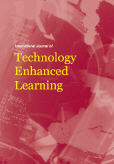
International Journal of Technology Enhanced Learning
Catalyzing Educational Excellence through Technology IntegrationInternational Journal of Technology Enhanced Learning, published by INDERSCIENCE ENTERPRISES LTD, is a premier scholarly journal that comprehensively explores the intersection of technology and education, fostering innovative approaches to enhance learning processes. Established in 2008 and continuing through 2024, the journal is pivotal for researchers, educators, and technology professionals aiming to disseminate and engage with cutting-edge developments in technology-enhanced learning environments. With an admirable ranking in Scopus—placing in the 72nd percentile of Education and 49th in Computer Science Applications—the journal reflects a robust influence in the fields of Computer Science Applications and Education, as evidenced by its Q2 and Q3 quartile rankings. The journal not only provides a platform for empirical research and theoretical discourse but also emphasizes practical implementations in e-learning. Although it does not offer open access, its curated collection of articles serves as a vital resource for scholars and practitioners who are dedicated to advancing the nexus of technology and education.
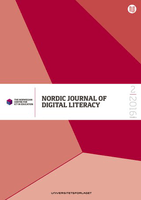
Nordic Journal of Digital Literacy
Advancing Research at the Intersection of Technology and LearningThe Nordic Journal of Digital Literacy, published by UNIVERSITETSFORLAGET AS, is a pioneering open-access journal dedicated to advancing research in the fields of Digital Literacy, Computer Science Applications, and E-learning. With an ISSN of 0809-6724 and an E-ISSN of 1891-943X, this journal highlights innovative studies that intersect education and digital technology, contributing significantly to the academic discourse in these rapidly evolving domains. The journal, based in Norway, has established itself within the academic community by achieving a commendable Q2 ranking in its respective categories for 2023. It currently ranks 518th out of 1543 in Social Sciences - Education and 461st out of 817 in Computer Science - Computer Science Applications according to Scopus metrics. By focusing on accessible research since its transition to open access in 2009, the Nordic Journal of Digital Literacy not only aims to disseminate knowledge but also empowers educators, researchers, and practitioners to integrate digital literacy into their practices, thus addressing the pressing educational demands of the digital age.

Contemporary Educational Technology
Innovating Learning for the Digital AgeContemporary Educational Technology is a premier journal published by BASTAS PUBL LTD - UK, specializing in the dynamic intersection of educational practices and technological advancements. With an E-ISSN of 1309-517X, this journal serves as a vital resource for researchers, educators, and professionals keen to explore innovative solutions and methodologies in education. Ranked in the Q2 category for both Education and Management of Technology and Innovation in 2023, Contemporary Educational Technology boasts impressive Scopus ranks, standing at #187 out of 1543 in the Social Sciences Education field, reflecting its influence and contribution to contemporary research. Through its open-access approach, this journal facilitates the dissemination of knowledge, making cutting-edge research readily available to a global audience. By examining developments from 2018 through 2024, it aims to critically analyze and promote the integration of technology in educational contexts, thereby fostering improved learning outcomes and innovative teaching practices.

EDMETIC
Empowering scholars to reshape the educational landscape.EDMETIC is a premier open access journal dedicated to the field of educational technology and innovation, published by the University of Córdoba, Faculty of Education Sciences. With its ISSN 2254-0059 and E-ISSN 2254-0059, EDMETIC has been serving the academic community since 2012, providing a platform for the dissemination of high-quality research that explores the intersection of education and digital technologies. Situated in the vibrant city of Córdoba, Spain, this journal invites contributions from both established and emerging scholars worldwide. With a commitment to fostering critical discussions and advancements in educational practices, EDMETIC is pivotal for researchers, professionals, and students interested in the dynamic landscape of educational technology. Authors and readers benefit from its open access model, which ensures that groundbreaking research is accessible to all, promoting a culture of knowledge sharing and collaboration.

Journal of E-Learning and Knowledge Society
Empowering Education Through Digital InnovationJournal of E-Learning and Knowledge Society is a premier academic journal dedicated to the exploration and advancement of e-learning and knowledge dissemination in contemporary society. Published by the SOC ITALIANA E-LEARNING, this journal has established itself as a vital resource for researchers and practitioners since its inception in 2006. With an open access model adopted in 2007, the journal promotes the free exchange of ideas and research findings, ensuring wide accessibility to academic contributions in this rapidly evolving field. The journal is indexed in notable databases and holds a Q3 classification in both Computer Science Applications and Education, reflecting its significant role in the advancement of educational technologies. Furthermore, its Scopus ranks highlight its relevance within the educational and computer science communities. Based in Rome, Italy, the Journal of E-Learning and Knowledge Society aims to bridge the gap between theory and practice, providing a platform for innovative research that shapes the future of digital learning environments. Whether you are a researcher, educator, or student, this journal offers valuable insights and developments in e-learning that are critical to navigating today’s knowledge society.
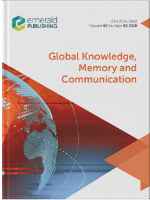
Global Knowledge Memory and Communication
Shaping the Future of Library Sciences WorldwideGlobal Knowledge Memory and Communication, published by EMERALD GROUP PUBLISHING LTD, is a leading journal in the field of Library and Information Sciences, with an impressive 2023 Q2 ranking in its category. With an ISSN of 2514-9342 and an E-ISSN of 2514-9350, this journal has been at the forefront of research since its inception in 2018 and is expected to run until 2024, showcasing significant contributions to the nexus of knowledge management and communication practices. Based in the United Kingdom, the journal's editorial scope encompasses diverse perspectives on how knowledge is created, shared, and retained in an increasingly digital world, making it a vital resource for researchers, academics, and practitioners in the social sciences. Furthermore, with its current Scopus ranking of #58 out of 280 in the library and information sciences category, which positions it in the top 79th percentile, the journal engages a global audience committed to advancing knowledge across disciplines. Though it is not an open-access journal, its rich and diverse content ensures it remains accessible to a wide readership, enabling meaningful discourse and innovation in the field.
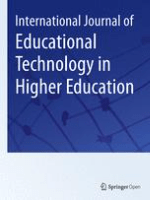
International Journal of Educational Technology in Higher Education
Exploring the nexus of technology and higher education.The International Journal of Educational Technology in Higher Education, published by Springer, stands as a pivotal platform for the dissemination of innovative research and findings in the field of educational technology. Since its inception in 2016, this open-access journal has been dedicated to enhancing the intersection of technology and education, providing scholars and practitioners with cutting-edge insights that shape contemporary educational practices. With a robust ISSN of 2365-9440, the journal has garnered impressive accolades, ranking in the top quartile (Q1) in both Computer Science Applications and Education disciplines as of 2023. Furthermore, it holds an esteemed position within the Scopus rankings, occupying rank #6 out of 1543 in Social Sciences Education, and #20 out of 817 in Computer Science Applications, highlighting its influential reach and scholarly impact. The journal especially focuses on how emerging technologies are transforming higher education, fostering a collaborative approach amongst researchers, educators, and professionals. By making its content openly accessible, it aims to bridge knowledge gaps and support the advancement of effective educational practices worldwide.

Magis-Revista Internacional de Investigacion en Educacion
Advancing Educational Insights for a Global AudienceMagis-Revista Internacional de Investigacion en Educacion, an esteemed journal published by the Pontificia Universidad Javeriana, Facultad de Educación, has been a vital contributor to the field of education research since its inception in 2008. With its Open Access policy, the journal ensures that valuable research findings are accessible to a global audience, promoting the sharing of knowledge and fostering collaboration among researchers, educators, and students. Currently positioned in the Q3 category in Education and ranked #893 out of 1543 in the Scopus Ranks for Social Sciences in Education, Magis maintains a commitment to advancing scholarly discourse through rigorous peer-reviewed publications. The journal's scope encompasses a wide array of educational topics, reflecting diverse perspectives and innovative methodologies. With a convergence of scholarly efforts until 2024, Magis is poised to play a pivotal role in shaping the future of educational research in Latin America and beyond.
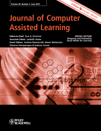
JOURNAL OF COMPUTER ASSISTED LEARNING
Elevating Educational Practices with Cutting-Edge InsightsWelcome to the JOURNAL OF COMPUTER ASSISTED LEARNING, a premier publication dedicated to the advancement of research in the fields of computer science applications, education, and e-learning. Published by WILEY, this journal has earned a prestigious reputation, holding a Q1 quartile ranking in both its primary categories for the year 2023. With its extensive reach since its inception in 1985, it features cutting-edge research that stimulates innovative practices in educational technology and pedagogical methods. Recognized for its impact with a remarkable Scopus ranking — 57th in Social Sciences/Education and 105th in Computer Science — the journal is a vital resource for scholars, educators, and practitioners looking to deepen their understanding of how technology enhances learning experiences. Although the journal is not open access, its commitment to quality research continues to resonate across the UK and globally, making it an essential platform for those engaged in enhancing educational outcomes through technology.

Campus Virtuales
Connecting Research and Practice in Virtual LearningCampus Virtuales is a prestigious academic journal published by RED UNIV CAMPUS VIRTUALES, dedicated to the exploration and advancement of knowledge in the fields of Education and Computer Science. With a notable presence in the academic community, it ranks impressively in Scopus—with an outstanding 95th percentile in the Social Sciences Education category and an 80th percentile in Computer Science Applications. Although the journal has ceased its coverage in Scopus since 2022, it remains a critical resource for researchers, professionals, and students interested in the intersection of virtual learning environments and technological innovations. The journal aims to foster discussions and disseminate research that enhances understanding of online education and digital tools in contemporary learning contexts. Situated in Huelva, Spain, and with an ISSN of 2255-1514, Campus Virtuales continues to champion scholarly dialogue and the development of best practices in virtual educational settings.